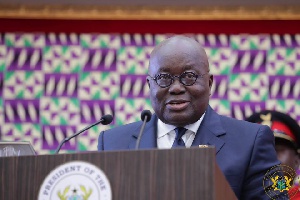 President Nana Addo Dankwa Akufo-Addo presenting the SONA
President Nana Addo Dankwa Akufo-Addo presenting the SONA
Introduction and Background
Every State of the Nation address provides a new opportunity for the president and the nation as a whole to reboot, re-assess situations and re-engineer the national wheel. It's a chance to evaluate who we are, where we stand and how best to move forward. Did the president do this? Did he paint an accurate picture of the state of the nation? Did he provide satisfactory measures to address the problems facing the nation? Did he give hope? Did he inspire? These are just but a few questions to consider in evaluating the President’s speech.
The central goal of this research was to analyse the President’s state of the nation address. To be specific the study set out to examine and ascertain the following:
• The functions of a state of the nation address (inspiration, broad theme, national unity, definition of nation’s problems, language, delivery and non-verbal cues, conclusion of speech)
• The various functions of political communication embedded in the speech (acclaim, attack and defend),
• The amount of words dedicated to emergent frames or themes in the speech
• Memorable quotes and symbolisms
The state of the nation address deserves critical public analysis or scrutiny because it is one of the president’s most important formal addresses which serves as the general blue print for the nation for the year. CNN’s Collinson (2019) defines it as constituting “typically long lists of proposals for government action and statements of foreign policy goals meant to be heard by America's foes and friends around the world.” It’s an important national and international event for the nation with opportunities to represent the country’s image globally.
The data for this research was the 2019 state of the nation address. A mixed method approach made up of both qualitative and quantitative methods was adopted as the methodological framework.
Find the full opinion piece below












